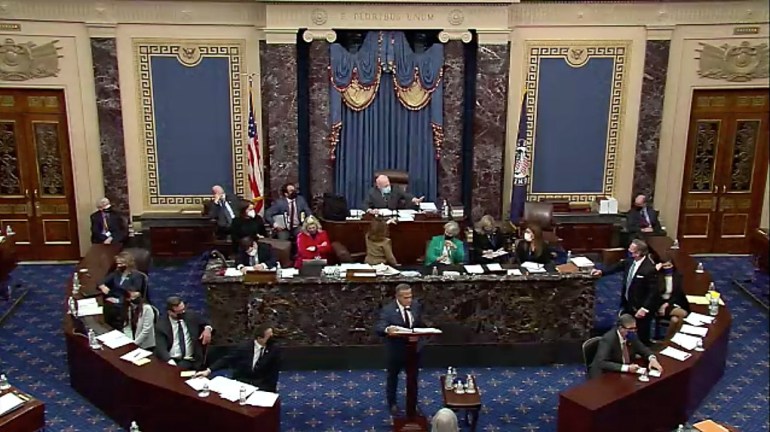While the parties to the nuclear agreement prepare to resume negotiations for the US return to the nuclear deal and Iran's commitment to its provisions, a high-level Israeli security delegation arrives in Washington to discuss the risks of returning to the agreement on Tel Aviv.
The visiting delegation is headed by senior Israeli national security officials, including National Security Adviser Meir Ben Shabat, and Mossad Director Yossi Cohen.
American reports indicated that the delegation received instructions from Prime Minister Benjamin Netanyahu to submit an objection to reviving the Joint Comprehensive Plan of Action and refuse to negotiate the essence of the agreement.
Will history repeat itself?
Weeks before Tehran and Washington, along with the Big Five, reached the nuclear deal in 2015, Netanyahu was a guest in Washington in response to an invitation sought by Republican leaders in both houses of Congress.
Netanyahu deviated from accepted diplomatic norms and delivered a speech hostile to negotiations between the administration of former President Barack Obama and the Iranian government.
And now history repeats itself, but in a different way. Netanyahu asked his senior government officials to head this week to the American capital, and meet with senior military and intelligence officials, and members of Congress, to provide intelligence on Iran, in order to convey Israeli concerns about the move to return to the nuclear agreement. .
The possibility of continuing Israeli strikes on Iranian targets without returning to Washington, is one of the dilemmas that the two sides have not overcome, according to commentators in the American capital.
Six years ago, Netanyahu’s efforts did not succeed in changing Washington’s stance, and the visit of Israeli officials is not expected to change the Biden administration’s stance that seeks to return to the nuclear agreement.
Mission Impossible
The director of the Atlantic Council’s Iran Future Initiative, Barbara Slavin, said that Biden administration officials would explain to the Israelis what the negotiations had reached, and would suggest that Israel stop attacking Iranian nuclear facilities during the course of the talks.
Slavin confirmed - in her interview with Al Jazeera Net - that she believes that Netanyahu's desire to prevent the United States from returning to the nuclear agreement will not succeed.
During the daily White House press conference, spokeswoman Jane Saki answered "no" when asked whether the visit was likely to change the administration's position on reviving the nuclear deal.
Saki touched on Washington's briefing of Israel on the path of negotiations related to the nuclear agreement, and told reporters, "With regard to Israel, we have kept them, as a main partner in these discussions, aware of our intentions, and we will continue to do so on any future visits."
Despite Saki's statement, former Israeli official Dore Gold said that it is important for Israel to share all relevant intelligence information on Iran with the United States, and to clarify the problem in negotiating with Iran, especially since the most convincing arguments are made face to face.
The dispute between America and Israel over the Iranian file
And Israel does not consider itself a party to the nuclear agreement, and therefore its official position is that it is not bound by it in any way.
It has repeatedly pledged to do its utmost to prevent Tehran from obtaining a nuclear weapon, and earlier this year, the Israeli ambassador to the United States - Gilad Erdan - warned that Washington and Tel Aviv would go their separate ways on Iranian policy if the Biden administration returned to the Comprehensive Plan of Action. Common.
Israel believes that returning to the previous agreement strongly serves Tehran's interests. Therefore, it demands that any new agreement should place restrictions on Iran's missile programs and limit its interference in the countries of the region, especially Iraq, Lebanon and Syria.
In contrast, the Biden administration believes that returning to abiding by the terms of the nuclear agreement would serve the strategic interests of the United States, as the agreement prevents Iran from developing its military nuclear capabilities.
Biden has pledged since the start of his presidential campaign more than a year ago to return to the nuclear deal from which the administration of former President Donald Trump withdrew in mid-2018.
Democratic leaders in Congress and most Republicans have concerns about the (European) nuclear deal.
Congressional position
The American and Israeli sides work to avoid publicly showing the size of the differences, as was the case in 2015, despite mutual frustration with the positions of both sides, and the lack of trust, coordination and transparency between them.
From here, Israel and the United States formed a joint working group to coordinate their efforts to prevent Iran from acquiring nuclear weapons, and the group met virtually on the 13th of this month at the level of national security advisers from both sides.
Many political circles in Washington agree with the Israeli proposal, which warns against returning to the terms of the old agreement.
In an interview with Al-Jazeera Net, David de Roch, a professor of security studies at the National Defense University and a former US military official, pointed out the importance of Israel agreeing to any nuclear agreement between Washington and Tehran if the parties want such agreements to succeed.
De Roche stated that this was not due to any malign Israeli influence in the United States, but rather because Israel's fears about the nuclear deal with Iran were genuine concerns that reflected the concerns of many Americans, such as Senate Democrat leaders Chuck Schumer and Bob Menendez, as well as most of the Republican right .
He said that if an agreement could be concluded that would address Israel's concerns, the agreement would also address the concerns of the Gulf Arab states, as well as the vast majority of American public opinion.

